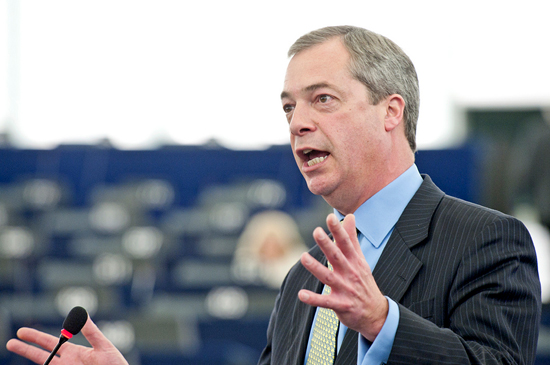
The local and European elections on 22 May were always going to be about whether the United Kingdom Independence Party (UKIP) would be able to demonstrate significant country-wide electoral support. That it won the most votes in the European elections, gaining 27.5% of the vote, beating the Labour Party into second place (25.4%) and the Tories into third (23.9%), shows the attractiveness of its simple anti-Europe and anti-immigrant message to Eurosceptic Tory voters. But it also appealed to sections of the working class who feel they are being left behind, and who blame their deteriorating position on EU immigrants who they think are getting a better deal than they are, especially in the areas of housing, free health care, jobs and welfare benefits.
The voting proportions were different in the local elections, with UKIP receiving 17% of the overall vote compared to Labour’s 31% and the Tories’ 29%. However, UKIP were able to gain over 160 new council seats, mainly at the expense of the Tories, although in some places such as Rotherham, Newcastle under Lyme and North East Lincolnshire, at the expense of Labour as well. The LibDems lost heavily in both European and local elections because they were seen as unprincipled careerists whose support had been crucial for driving through the government’s austerity programme.
Voting patterns were very different in London with its high proportion of migrant workers and a large population of black and Asian people. UKIP managed to win only 10 council seats, while Labour won control of Hammersmith and Fulham, dubbed David Cameron’s ‘favourite council’, and of four other councils including Croydon. In the European election, Labour also gained two MEPs and obtained more than double UKIP’s vote (807,000 compared to 371,000; the Tories managed 496,000).
Throughout the election campaign UKIP leader Nigel Farage refused to be drawn any issue other than EU membership and immigration. He denied that UKIP is a racist party but gave a nod and a wink to those potential supporters who believed it is. A succession of homophobic, Islamophobic and straightforward racist comments by both supporters and candidates did not affect UKIP’s standing in the polls. Farage’s carefully-cultivated straightforward and blokeish image with him standing in a pub with a pint glass, was only once disturbed when in a radio interview he said he would be worried if a group of Romanians moved in next door. Asked what his attitude would be if it were a German neighbour – Farage’s wife is German – he dissembled and then said ‘you know the difference’. Later UKIP took out a full-page advertisement in the Daily Telegraph to deny it was a racist party, but claimed that Romanians were responsible for 92% of ATM crime in London. A later attempt to prove its multiethnic support with a carnival in Croydon turned into a fiasco when the steelband hired for the occasion refused to play when it realised that the event was organised by UKIP.
UKIP’s anti-immigration message has been geared towards the working class, with its election leaflets claiming that ‘unlimited immigration costs British jobs’ and that ‘cheap labour pushes down British wages’. The election coincided with news that net migration to the UK in 2013 was 212,000. In the 12 months to March 2014, instead of the floods of immigrants predicted there had been 29,000 Romanian and 7,000 Bulgarian immigrants.
In an effort to hang on to the votes of working class supporters attracted by UKIP’s racism, Labour Party leader Ed Miliband said that worrying about immigration is not prejudice, and, elaborated on this in a speech to Airbus workers in Broughton:
‘We said that people needed to change their attitudes. But in fact, we needed to change ours, because people see their communities changing fast around them. They worry about the entitlements people have when they come here and the pressure it might put on the system. And, especially with the cost of living crisis that our country faces, people ask about the impact of immigration on their wages and terms and conditions.’
These are exactly the sort of voters that the Labour Party needs to win if it to stand a chance at the 2015 general election: skilled workers fearful about impoverishment. In a later interview, Miliband declared: ‘I do want to get low-skilled immigration down’ and that he would impose a six-month restrictions on benefits for EU migrants and longer transitional controls for new EU-accession countries. ‘We need to stop a race to the bottom between British citizens and workers coming here from abroad,’ he said.
UKIP’s ability to take working class support from the Labour Party has grown not just because Labour has totally failed to oppose the Tory austerity agenda and has fully participated in local council cuts, but also because the trade unions have squashed any resistance to them. The consequence has been the absence of local campaigns representing working class interests. It is therefore not surprising that where there were sham electoral campaigns, such as those organised by the Trade Union and Socialist Campaign (TUSC), they performed very poorly; overall TUSC stood 560 candidates in the local elections but got fewer than 100 votes on average. In the few instances where candidates or parties clearly identified with and participated in local struggles, the result could be entirely different. In Kirkby, Merseyside, an independent working class campaign 1st 4 Kirkby, which has also been involved in the fight against the bedroom tax locally, stood six candidates and got up to 46% of the vote in the six wards they contested. The way to defeat UKIP is not by adopting their programme as the Labour Party and Conservatives are attempting, but by opposing their racist programme and vigorously defending working class interests.
Robert Clough




